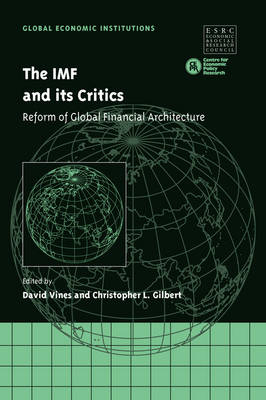
The IMF and its Critics
Cambridge University Press (Verlag)
978-0-521-82154-4 (ISBN)
David Vines is a Fellow in Economics at Balliol College Oxford, Adjunct Professor of Economics at the Australian National University, and a Research Fellow of CEPR. He is co-editor of The World Bank: Structure and Policies (CUP, 2000). Christopher Gilbert is Professor of Finance in the Department of Finance at the Vrije Universiteit, Amsterdam, and a Fellow of the Tinbergen Institute. He is co-editor of The World Bank: Structure and Policies (CUP, 2000).
Introduction; 1. The IMF and international financial architecture: solvency and liquidity Christopher L. Gilbert, David Vines; 2. Progress towards greater international financial stability Andrew Crockett; 3. International coordination of macroeconomic policies: still alive in the new millennium? Lawrence H. Meyer, Brian M. Doyle, Joseph E. Gagnon, Dale W. Henderson; 4. The Report of the International Financial Institution Advisory Commission: comments on the critics Allan H. Meltzer; 5. Reforming the global financial architecture: just tinkering around the edges? Malcolm Knight, Lawrence Schembri, James Powell; 6. The IMF and capital account liberalisation Dominic Wilson; 7. How should the IMF view capital controls? Gregor Irwin, Christopher L. Gilbert, David Vines; 8. The resolution of international financial crises: an alternative framework Andrew G. Haldane, Mark Kruger; 9. Whose programme is it? Policy ownership and conditional lending James M. Boughton, Alex Mourmouras; 10. The IMF and East Asia: a changing regional financial architecture Gordon de Brouwer; 11. The role of the IMF in developing countries Graham Bird, Paul Mosley; 12. Argentina and the Fund: anatomy of a policy failure Michael Mussa; 13. Countries in payments' difficulties: what can the IMF do? Andrew Powell; 14. Accountability, governance and the reform of the IMF Ngaire Woods; 15. The IMF at the start of the twenty-first century: what has been learned? On which values can we establish a humanised globalisation? Michel Camdessus; Index.
| Erscheint lt. Verlag | 26.2.2004 |
|---|---|
| Reihe/Serie | Global Economic Institutions |
| Zusatzinfo | 12 Tables, unspecified; 11 Line drawings, unspecified |
| Verlagsort | Cambridge |
| Sprache | englisch |
| Maße | 161 x 236 mm |
| Gewicht | 882 g |
| Themenwelt | Wirtschaft ► Betriebswirtschaft / Management ► Finanzierung |
| Wirtschaft ► Betriebswirtschaft / Management ► Marketing / Vertrieb | |
| Wirtschaft ► Volkswirtschaftslehre ► Finanzwissenschaft | |
| Wirtschaft ► Volkswirtschaftslehre ► Makroökonomie | |
| Wirtschaft ► Volkswirtschaftslehre ► Wirtschaftspolitik | |
| ISBN-10 | 0-521-82154-1 / 0521821541 |
| ISBN-13 | 978-0-521-82154-4 / 9780521821544 |
| Zustand | Neuware |
| Haben Sie eine Frage zum Produkt? |
aus dem Bereich


